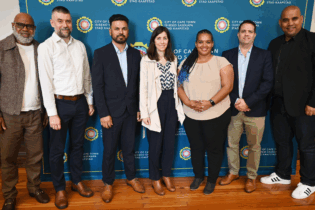Small, medium and micro enterprises (SMMEs) are the lifeblood of South Africa’s economy. They make up 98% of businesses and employ between 50 and 60% of the country’s workforce according to a post-covid report by McKinsey & Company dated July 2020.
Liphu January, site agent for GVK-Siya Zama says that in the construction sector, SMMEs face specific challenges which is why it is vital that they get the necessary experience, exposure and assistance from the bigger construction companies in order for their businesses to grow. “There is a great opportunity for this when bigger construction companies are building within a community and can therefore also help build up the community in the area.” This was the case with one GVK-Siya Zama’s recently completed construction projects, Abram Hlophe Primary School, in Katlehong. January, who has a BSc Honours in Construction Studies, was a site agent who was responsible for the smooth operation of the project. Upskilling SMMEs in construction and in business Relationships with community SMMEs are not always simple at the start of a project. SMMEs may have had bad encounters of poor management or a lack of opportunities when previous projects were built in their area. This sometimes causes friction and apprehension at the outset of a project. January has learnt that setting up a well-represented Project Steering Committee at the outset of a project is vital for the successful integration of community SMMEs into the various trades. “At Abram Hlophe we all agreed that it was essential to meet deadlines and deliver quality work in order to produce the best results for our client and for the SMMEs that we were working with,” said January. “We also outlined the financial standing of the project which assisted the SMMEs to ascertain where and how they would make money and how much they expected to earn.” This resulted in relevant training that the business owners could use in their companies in future, January added. “For example, we pointed out details such as how the quantity surveyor worked out how many squares of paving must be laid per day in order to make a profit.” “Once the SMMEs knew what their targets were, they were able to calculate how many hours they would need to work to reach their targets, and in true entrepreneurial spirit could be found working extra hours and over weekends.”Assisting SMMEs to navigate a tough landscape
Late payments have impacted SMMEs for many years, not to mention the strain of not being able to work during the national lockdown had on their cash flows, says January. “Most of the SMMEs that we worked with operated close to the margins and could not survive slow or irregular payments.” As such, GVK-Siya Zama has through the years of collaborating with local SMMEs, established the practice of fortnightly payments, regardless of its own payment schedule on a project, to assist SMMEs financially. Entrepreneurs making a difference This year’s Global Entrepreneurship Monitor reports that South Africa has one of the highest percentages of SMMEs whose motivations are to make a difference in the world. “This was reflected in the SMMEs that we worked with on site,” said January. Although the creation of jobs and transfer of skills were the primary goals, the entrepreneurs portrayed a sense of pride that they were building something of value in their community that would be beneficial to the people living there. Abram Hlophe Primary School became a feature and everyone who worked on it wanted their children or grandchildren to attend it. She recalls one of the workers saying: “I will tell my granddaughter that I laid that brick when she comes to school here.” Pherdy le Roux, Managing Director of GVK-Siya Zama’s Gauteng business says he is proud of how January has grown at GVK-Siya Zama over the past two years and of the work she has put in to improve and uplift local SMMEs as a site manager for projects such as these. “It is a time when just knowing how to build is not good enough, as contractors we need to understand how tough the industry is for smaller companies to survive,” he adds. “We need the ability to understand the strengths, frustrations and limitations of the communities where we work and show a true desire for community development and upliftment. Liphu has this ability, she represents the future of the construction industry, she is a new age contractor and the type of person we need in this industry.” January concludes by encouraging big businesses in South Africa to be cognisant of the benefits that come with working with SMMEs when they are assisted to grow and participate in the economy. “Local SMMEs really have a willingness to go the extra mile and can add immeasurably to the success of a project. In the end we win, the SMMEs win and the community is of course the biggest winner.”






